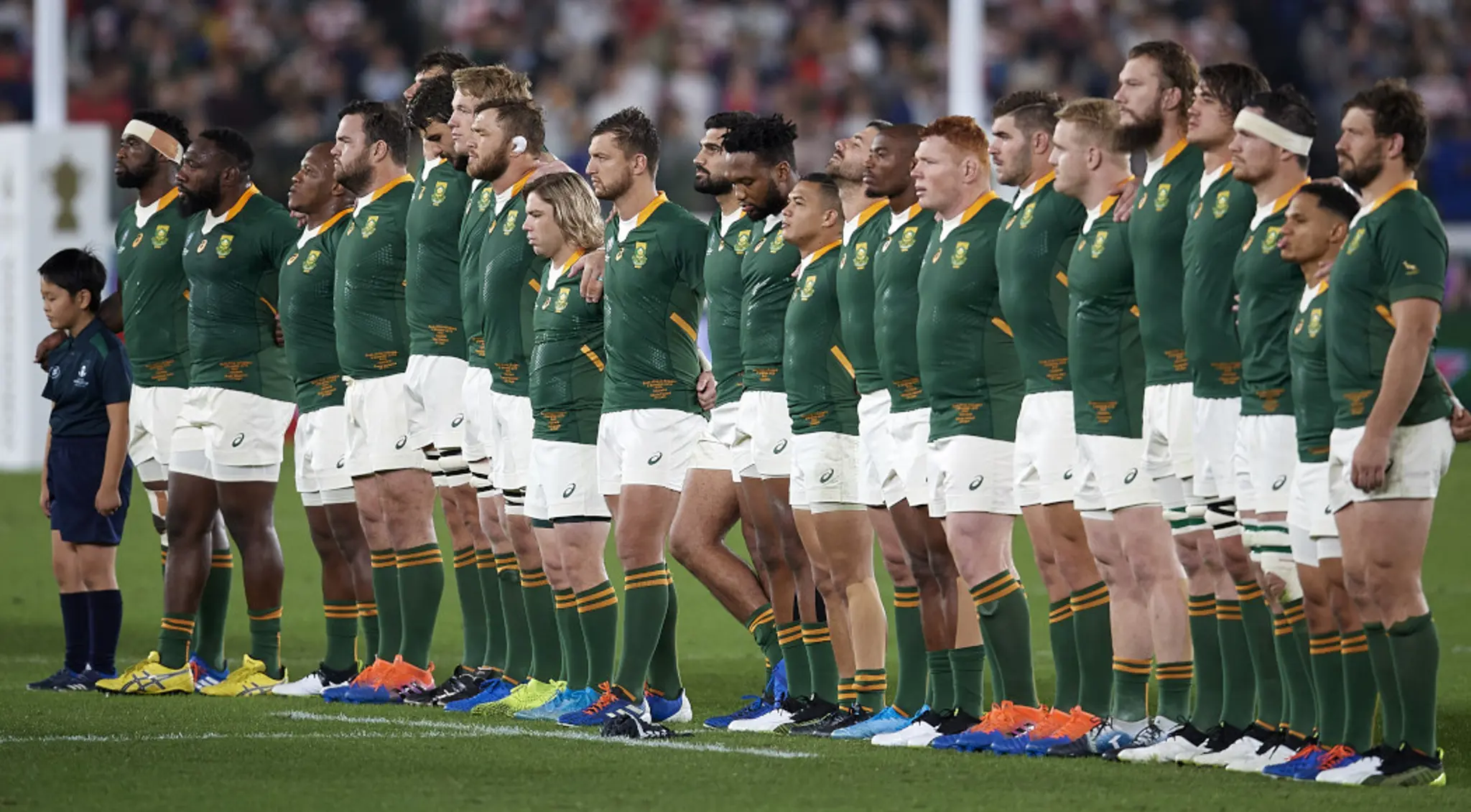Advertisement
Why is the Lions series one that shouldn't be missed

The Springbok squad for the series against the British and Irish Lions will be announced on Saturday evening and the world will be watching, but what is it that makes the next few months such a special event in rugby that it is only rivalled by the Rugby World Cup?
There are several answers to that question, but let’s start out by contextualising the Lions and outlining who they are. While the New Zealand All Blacks were acknowledged as South Africa’s fiercest rivals throughout the 20th century, it was in fact the Lions who were the Springboks’ oldest and longest standing adversaries.
RUGBY’S FIRST INTERNATIONAL TOURISTS
Rugby’s first major tour was the one undertaken by a British composite team to New Zealand and Australia in 1888. A travelling party of 22, made up mostly of England players but including one Welshman, three Scots and one Irishman, embarked on a 249-day tour under the captaincy of Robert Sneddon, who tragically drowned during the Australian leg of the tour and is buried there.

* Get DStv to watch the announcement, and every game, LIVE *
But that tour wasn’t officially sanctioned by the rugby authorities, and included only matches against provincial teams and there were no test matches.
Three years later the rugby authorities had fully embraced the concept of the overseas tour and when Scottish wing Bill Maclagan led another British Isles team to South Africa for what was to be the first series played in this country, it was officially sanctioned by the England union, the RFU.
The RFU connection led the team to be being recognised initially as the England Rugby Football Team, but the presence of three Scots in addition to the captain, Maclagan, led to it being recognised as a British Isles team retrospectively.
HOSTS WERE QUICK LEARNERS
The first ever test match, which was played in front of a reported 6000-strong crowd, took place at the Port Elizabeth Cricket Ground, and was won 4-0 by the British Isles. South Africans had been introduced to rugby later than their British counterparts and were beaten 3-0 in the series. But they proved to be quick learners, and although the British Isles won the following series in 1896 too, South Africa’s victory in the final game of that series was a harbinger of what was to come for the British team.
Indeed, it wasn’t until Willie John McBride’s team famously smashed the Springboks 3-0 in 1974, with the final game of a four match rubber being drawn, that the British team made up of players from the four Home Unions - England, Scotland, Wales and Ireland - were to win a series in South Africa again.
The colonised did become the rulers of the game after that, for while the British team did win in Australia fairly regularly and they also toured Argentina in the initial years - their last tour there was in 1936 - they also had to wait nearly three quarters of a century to win a series in New Zealand (1971).
WHEN AND WHY LIONS BECAME KNOWN AS LIONS
Although they only officially became known as the British Lions in 1950, the reference was started by rugby writers, both South African and the travelling British press corp, when they toured here in 1924. They were known as Lions because of the lion emblazoned on their badge. It was Sam Walker, the captain of the 1938 team that lost a series 3-1 to the Springboks, who was the first player to refer to the team as Lions, which he did in his after-match speech following the fourth test.
???? Stronger Together. Stronger Forever ??
— SuperSport ?? (@SuperSportTV) June 2, 2021
Don't miss the first @Springboks Squad announcement since their epic 2019 Rugby World Cup triumph, this Saturday at 18:30 (CAT). pic.twitter.com/VLaLa8v2aq
The British and Irish Lions - the Irish bit was added in the late 1980s, before that they were just the British Lions - have made three official non-tour appearances, all of which have been on home soil. And teams styled as "the Lions" have turned out on three additional occasions, two on home soil and one in France.
TOURING CENTRAL TO THE ETHOS
But touring, and having to conquer foreign conditions as well as fearsome foreign foe, is central to the Lions ethos, and was one of the reasons there was such an outcry when it was learned that, because of Covid, the UK and Ireland was at one stage being considered as the venue for this 2021 series.
It wasn’t surprising that the aforementioned Willie John McBride led the protests. The reason his team’s winning effort here in 1974 sent such reverberations around the rugby world was because it was the first time this century that the Lions had not only tamed the feared Springboks, but also the hard highveld surfaces in games played under the hot African sun.
The Lions hosting a visiting team just wouldn’t be the same, for it was the infrequency of series wins in the backyards of the game’s super-powers of the 20th century, South Africa and New Zealand, that made being part of a Lions tour such an event and such a challenge. Playing a Lions series in the UK would have been akin to changing the route of the Comrades Marathon to a flat, coastal course - it just wouldn’t be the same thing.
PLAYING TEAM OF FOUR NATIONS BECOMING MORE CHALLENGING
So apart from the historical angle of the Lions being the oldest rivals and the first International rugby tourists, what is it that makes a Lions tour so special? Firstly, it is because the team is made up of players of four different nations, something which is being recognised as more of a challenge by players from New Zealand, Australia and South Africa than it used to be.
To put that in context, the four Home Union teams have won individual games in South Africa and New Zealand during the course of history - well some of them have - but none of England, Wales, Scotland or Ireland have ever won a series here. It was the Irish team that played here five years ago, and scored their first ever test win on South African soil in the first match in Cape Town, that came the closest. And that’s why it is becoming more challenging for the hosts - in the professional era the gap between the north and south has closed.
WHY LIONS SERIES WINS ARE SO CELEBRATED IN UK
But while they are now being seen as formidable rivals in the Rugby World Cup era, the individual nations that make up the Lions touring squads still see series wins in South Africa and New Zealand as a bridge too far. And that is part of the reason why the wins here in 1974 and 1997 and in New Zealand in 1971 were such celebrated events in the UK.
The 1971 team were reportedly shocked by the reception they received when they landed back home after that series triumph, and rugby in the United Kingdom and Ireland was significantly boosted by the follow up win in South Africa three years later. It is why that time is still regarded as the golden era of British rugby. The period was defined by those winning Lions trips.
A ONCE IN A LIFETIME CHALLENGE FOR MOST
The next reason a Lions tour/series is so special is that in the modern era it happens without the frequency of the games that are played between individual nations. Since the inception of the Tri-Nations, which has now become the Rugby Championship, in 1996 the Springboks and All Blacks clash at least twice - home and away - every year. The Home Unions and France play each other every year in the Six Nations, there are cross-hemisphere clashes annually in the June and November international windows.
A Lions tour happens only once every four years. And as they spread themselves between New Zealand, South Africa and Australia, the host nation only sees them once every 12 years. It means a Springbok player only usually gets to play against the Lions in a series once in his playing life, and it is why if you speak to former Bok players who were part of the l997 series you will discover that the loss still hurts deeply.
The Lions tours, although they are becoming more truncated in the era of professionalism, are also the remaining vestige of the old touring ethos that was so much part of rugby in the amateur era. Meaning they play games against provincial teams too. And the provincial/franchise players remember those games as special events for the rest of their lives, as do the spectators who were at some of the more epic of those games.
For instance, you won’t get it anymore, but when the 1980 Lions under Bill Beaumont came to Durban in 1980 the Natal papers ran long retrospective features on what at that point was recognised as one of the most famous days in Natal rugby history - the 3-all draw achieved in 1924 by Taffy Townsend’s team.
The popularity of the Lions has been built in the modern era too around the large travelling parties from Britain that follow the tourists. The 2009 Boks talk about how shocked they were when they ran out onto the King’s Park field for the first test of that tour and were confronted by a sea of red on the eastern stand.
UNBEATEN SINCE 2009 BRINGS ADDED INTEREST
Sadly, because of the pandemic we won’t have that this time, but the recent successes of the Lions will ensure that there is still an intense focus overseas on this series.
When the Lions lost here to an epic long-range penalty from Morne Steyn at Loftus in 2009, it became clear that with the final test still to come and a dead rubber, questions were being asked about the future of Lions tours. They needed some kind of success to give the concept and the brand a boost.
Well, that has happened subsequent to 2009, and part of the reason this series seems bigger than the one then is because the Lions haven’t been beaten in a series since then. They hammered Australia in Australia in 2013 and then drew the series with the All Blacks in 2017.
That last mentioned series in particular would have multiplied the credo of a Lions tour a good couple of notches, for no-one in the modern era shares a series in New Zealand. And they damn nearly won it too.
This series is going to feature the near conquerors of the 2015 Rugby World Cup champions against the reigning World Cup champions. If that was a boxing match, it would be a sure sell for any promoter. It is a pity there are unlikely to be spectators, but it will be a clash of titans that is not to be missed.
Just think about it - the Boks beat England in the Yokohama final to beat win the World Cup, but before that they had to rely on a late penalty to beat Wales in the semifinal. Now the players from those two nations, and Ireland and Scotland, are brought together into the same team. Winning a Lions series has become an achievement as much for the hosts as it has always been for the travelling side.
Advertisement